Similar titles: Cultural Critique
-
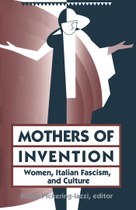 Mothers of Invention
Women, Italian Facism, and Culture
Robin Pickering-Iazzi, Editor
1995 Fall
Mothers of Invention
Women, Italian Facism, and Culture
Robin Pickering-Iazzi, Editor
1995 Fall
- The first in-depth look at culture produced by women in Fascist Italy.
-
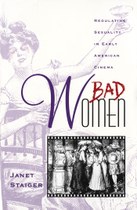 Bad Women
Regulating Sexuality in Early American Cinema
Janet Staiger
1995 Fall
Bad Women
Regulating Sexuality in Early American Cinema
Janet Staiger
1995 Fall
- Charts the cultural tensions played out on-screen in early American cinema.
-
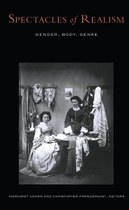 Spectacles of Realism
Gender, Body, Genre
Margaret Cohen and Christopher Prendergast, Editors
1995 Fall
Spectacles of Realism
Gender, Body, Genre
Margaret Cohen and Christopher Prendergast, Editors
1995 Fall
- A rethinking of realism that reveals its relevance to sexual and cultural politics.
-
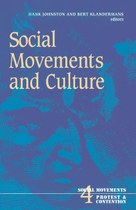 Social Movements and Culture
Hank Johnston and Bert Klandermans, Editors
1995 Spring
Social Movements and Culture
Hank Johnston and Bert Klandermans, Editors
1995 Spring
- Reflecting the recent surge of interest in culture, this volume brings together top researchers in the field of social movements whose work represents the major approaches to movement analysis from a cultural perspective. The contributors address such issues as approaches to culture; how movements are affected by the culture of the larger society in which they act; and the internal cultures of these movements. Contributors include Michael Billig, Rick Fantasia, Gary Alan Fine, William A. Gamson, Eric Hirsch, Jane Jenson, John Lofland, Alberto Melucci, Ann Swidler, Verta Taylor, and Nancy Whittier.
-
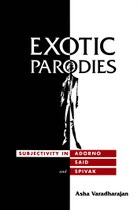 Exotic Parodies
Subjectivity in Adorno, Said, and Spivak
Asha Varadharajan
1995 Spring
Exotic Parodies
Subjectivity in Adorno, Said, and Spivak
Asha Varadharajan
1995 Spring
- This groundbreaking text begins with the premise that postmodernism, poststructuralism, postcolonialism, and Marxism continue to present certain problems with the self/other distinction. It goes on to offer the first extended critique of the work of Gayatri Spivak; challenge the critical reception of Adorno in the American academy; examine Said's connection to Adorno; and make the first in-depth use of Adorno's Negative Dialectics in the context of postcolonial theory.
-
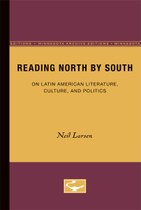 Reading North by South
On Latin American Literature, Culture, and Politics
Neil Larsen
1995 Spring
Reading North by South
On Latin American Literature, Culture, and Politics
Neil Larsen
1995 Spring
- Concerned with misleading interpretations of literature and culture that dominate Latin American studies, Larsen proposes the need for a freshly conceived historical materialist approach to Latin American texts and cultural practices. He provides insightful commentaries on political discourses, cultural events, films, and literary texts, as he draws upon a wide diversity of texts written in Portuguese, Spanish and English. Of particular interest is Larsen's discussion of writings from the Caribbean, an area that is not frequently included in Latin American studies.
-
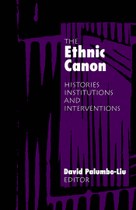 The Ethnic Canon
Histories, Institutions, and Interventions
David Palumbo-Liu, Editor
1995 Spring
The Ethnic Canon
Histories, Institutions, and Interventions
David Palumbo-Liu, Editor
1995 Spring
- Argues that texts are added to the canon only after an operation that attempts to resolve and neutralize historical and political contradictions and differences. The Ethnic Canon offers a wide variety of critical viewpoints and is unique in its pointed critique of the academy regarding specific authors and texts that have and have not been included in the canon. Contributors include Norma Alarcón, Paula Gunn Allen, Elliott Butler-Evans, Barbara Christian, Lisa Lowe, Colleen Lye, Ramón Saldívar, E. San Juan Jr., Rosaura Sánchez, Jana Sequoya-Magdaleno, and Sau-ling Cynthia Wong
-
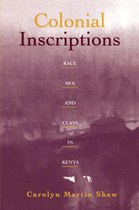 Colonial Inscriptions
Race, Sex, and Class in Kenya
Carolyn Martin Shaw
1995 Spring
Colonial Inscriptions
Race, Sex, and Class in Kenya
Carolyn Martin Shaw
1995 Spring
- Explores how images of African colonialism have been influenced by European and American racism and sexual fantasies.
-
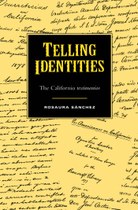 Telling Identities
The Californio testimonios
Rosaura Sánchez
1995 Spring
Telling Identities
The Californio testimonios
Rosaura Sánchez
1995 Spring
- Sánchez offers the first historical and literary analysis of thirty 1870s testimonios from the original Spanish-speaking settlers of Alta California. Telling Identities scrutinizes the role of gender, class, race, language, and ethnicity in group identity formation as it looks into history to help articulate the cultural politics of contemporary Chicano and Latino culture in the United States.
-
 Cultural Materialism
On Raymond Williams
Christopher Prendergast, Editor
1995 Spring
Cultural Materialism
On Raymond Williams
Christopher Prendergast, Editor
1995 Spring
- Widely regarded as one of the founding figures of international cultural studies, Raymond Williams is of seminal importance in rethinking the idea of culture. In tribute to his legacy, this edited volume is devoted to his theories of cultural materialism and is the most substantial and wide-ranging collection of essays on his work to be offered since his death in 1988. "Raymond Williams was the last of the great European male revolutionary socialist intellectuals born before the end of the age of Europe (1492-1945)." --Cornel West Contributors include Stanley Aronowitz, John Brenkman, Peter de Bolla, Catherine Gallagher, Stephen Heath, John Higgins, Peter Hitchcock, Cora Kaplan, David Lloyd, Robert Miklitsch, Michael Moriarty, Morag Shiach, David Simpson, Gillian Skirrow, Kenneth Surin, Paul Thomas, Gauri Viswanathan, and Cornel West.
-
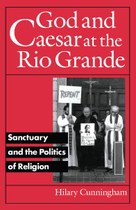 God and Caesar at the Rio Grande
Sanctuary and the Politics of Religion
Hilary Cunningham
1995 Spring
God and Caesar at the Rio Grande
Sanctuary and the Politics of Religion
Hilary Cunningham
1995 Spring
- Hilary Cunningham offers a fascinating account of the history and growth of the Sanctuary movement in the U.S., as she demonstrates how religion shapes and is shaped by political culture. Focusing on the Sanctuary located in Tucson, Arizona, Cunningham explores the movement primarily through the experiences of everyday participants conveyed through interviews with Sanctuary workers as well as reproductions of documents from her stays in Arizona, Mexico, and Guatemala. One of few books to document the culture of the religious left in the U.S., God and Caesar at the Rio Grande illustrates how a group of people used religious beliefs and practices to interpret and respond to State authority.
-
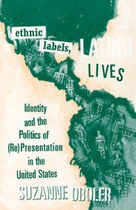 Ethnic Labels, Latino Lives
Identity and the Politics of (Re) Presentation in the United States
Suzanne Oboler
1995 Spring
Ethnic Labels, Latino Lives
Identity and the Politics of (Re) Presentation in the United States
Suzanne Oboler
1995 Spring
- Hispanic or Latino? Mexican American or Chicano? Social labels often take on a life of their own beyond the control of those who coin them or to whom they are applied. In Ethnic Labels, Latino Lives, Suzanne Oboler explores the history and current use of the label “Hispanic,” as she illustrates the complex meanings that ethnicity has acquired in shaping our lives and identities.
-
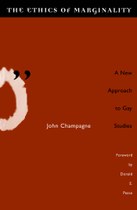 The Ethics of Marginality
A New Approach to Gay Studies
John Champagne
1995 Spring
The Ethics of Marginality
A New Approach to Gay Studies
John Champagne
1995 Spring
- An original and timely critique which moves gay studies beyond both identity politics and the “rights” discourse, as it questions whose interests are served in an uncritical celebration of the Other. Champagne analyzes a number of recent films, including Paris is Burning, Urinal, and Marlon Riggs' 1989 video Tongues Untied, along with gay pornography. He uses the work of such critics as Jacques Derrida, Michel Foucault, and Gayatri Spivak, as he establishes a ground-breaking and controversial new theoretical model for studies of the Other.
-
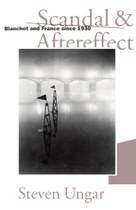 Scandal and Aftereffect
Blanchot and France since 1930
Steven Ungar
1995 Spring
Scandal and Aftereffect
Blanchot and France since 1930
Steven Ungar
1995 Spring
- Why have literary critics, as in the cases of Martin Heidegger and Paul de Man, chosen to ignore or suppress Blanchot's right-wing interwar and wartime writings, focusing instead on his postwar production? Scandal and Aftereffect provides an enlightening and provocative examination of this question, as Steven Ungar looks at 100 articles published under Blanchot's signature between 1932 and 1937 in such right-wing publications as Combat, Le Rempart, and l'Insurgé.
-
 Travelers, Immigrants, Inmates
Essays in Estrangement
Frances Bartkowski
1995 Spring
Travelers, Immigrants, Inmates
Essays in Estrangement
Frances Bartkowski
1995 Spring
- Uses travel writings, U.S. immigrant autobiographies, and concentration camp memoirs to illustrate how tales of dislocation present readers with a picture of the complex issues surrounding mistaken identities. Bartkowski's elegantly written and incisive book stands at the crossroads of contemporary thought in cultural studies and ethnicity, race and gender, nationalism, and the politics and poetics of identity.